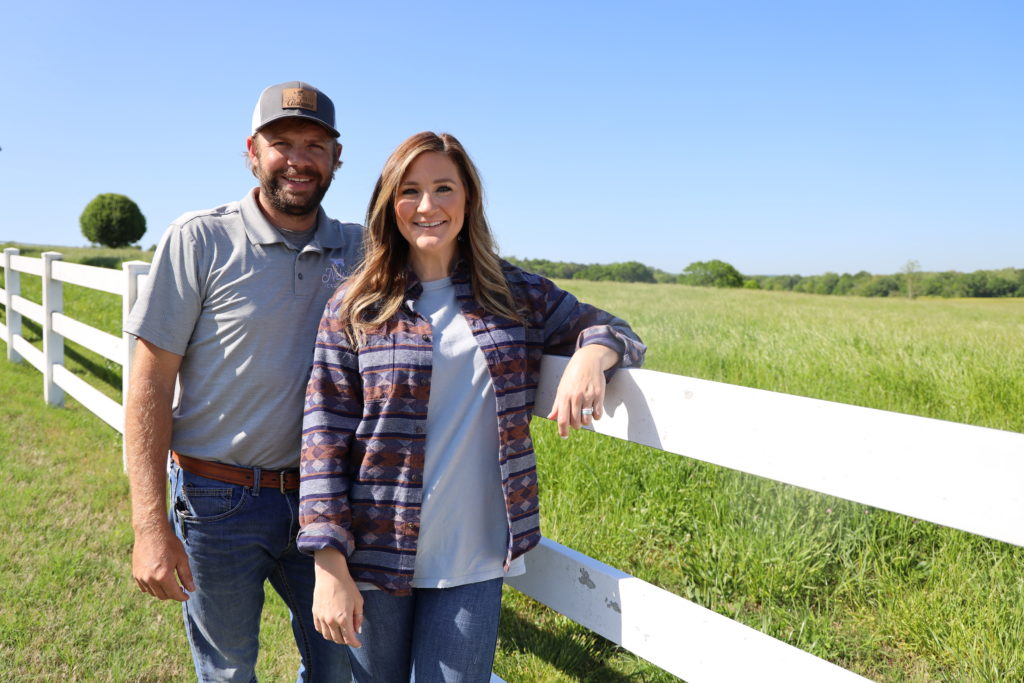Hay Fever: Couple Finds Greener Grass Of Urban Sprawl

By Marlee Moore
As urban encroachment eats up Jefferson County farmland, Evan Nelson is growing mulch hay to limit erosion on construction sites.
“When we spread hay out on a job site, it slows down the dirt from getting washed away,” said Nelson, 33, a firefighter-turned-farmer who’s expanding an enterprise founded decades ago by business partner Wally Kornegay’s family.
To help prevent erosion, exposed soil is sprinkled with grass seed and fertilizer. Square bales of hay are fed into a 125-mph blower and strewn onto the soil — providing a buffer to lessen the impact of rain hitting the ground. The hay also protects the grass seed, allowing it to flourish.
The environmental benefits of Nelson’s crop, however, begin long before it’s cut. Because perennial grass helps conserve soil, filter water and manage nutrient runoff, the Nelsons are allowed to farm in fertile, restricted-use floodways in western Jefferson County.
“Hay is not just for horses,” said Nelson’s wife, Christy. “That’s such a small portion of what we do.”
Hay season starts in spring for most farmers as grass greens up and swaths of dry weather help reduce moisture while increasing hay quality. Since mulch hay isn’t fed to livestock, nutritional quality is less of a priority for the Nelsons.
“We cut hay every day, because if it’s not on the ground, we can’t bale and deliver it,” said Nelson, who farms near McCalla. “We can bale hay and have it on a job site that same day.”
Nelson cuts, teds (fluffs) and bales hay in a three-day sequence during the heat of summer. Drier ground allows Nelson to cut hay year-round. An accumulator stacks bales, which are then snagged by a grapple, placed on a trailer and sent out for delivery.
Nelson’s phone buzzes frequently, lengthening his to-do list with delivery logistics, meetings and long trips to the hay field.
Deliveries are often part of long-term contracts and range from south of Montgomery to Fayette County to the Georgia line. But local hay hauling is a hefty part of the business, too.
“Being near development gives us an advantage,” said Christy, who shares her family’s adventures on the @nelsoncattleco Instagram account. “Opportunities have opened up for us in this area, and they all surround our house.”
The Nelsons and their sons, Cash, Crue and Briggs, have found a community of like-minded, farm-focused friends with the Jefferson County Farmers Federation (JCFF). They got involved in 2017 through Kornegay, a JCFF board member, and eventually met Alabama Farmers Federation Area 5 Director David Heflin.
Heflin said an unusual source helps fuel the Nelsons’ niche market.
“Restrictions sometimes make life harder for farmers,” Heflin said. “But restrictions related to erosion prevention provide a lot of Evan and Christy’s business. That’s also allowed them to farm near a metro area (in restricted-development creek bottoms).”
In addition to selling hay for erosion control, the Nelsons sell square and round bales for feed. It’s part of their diversification strategy to spread risk, and it works well with their cattle herd and other conservation and construction work.
“I had no idea there was a world like this,” Nelson said. “It’s different, but it’s lucrative, and God’s opened up doors to make this business grow.”
